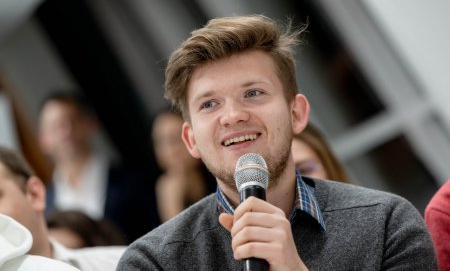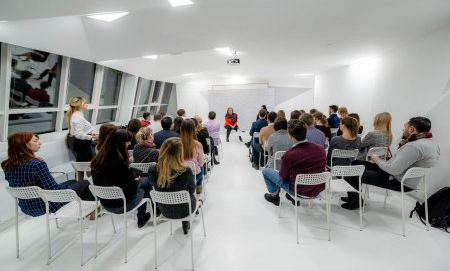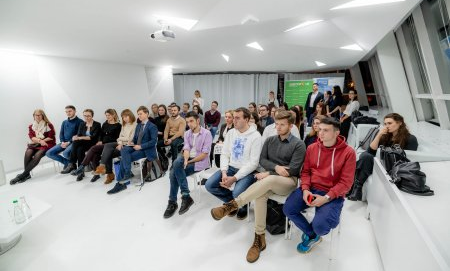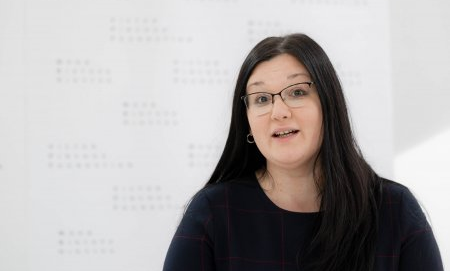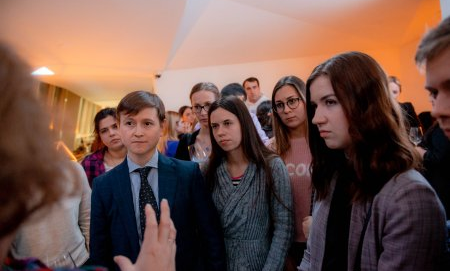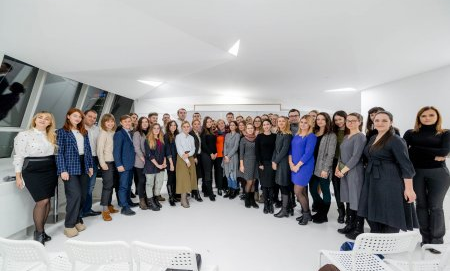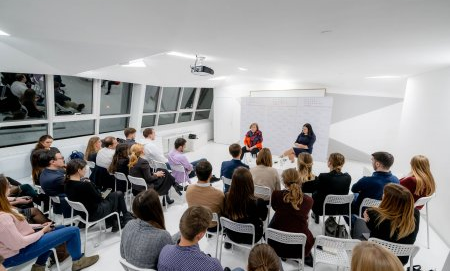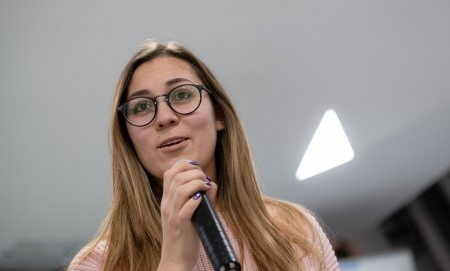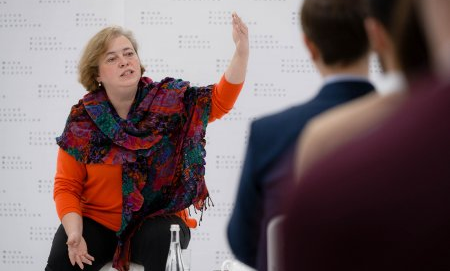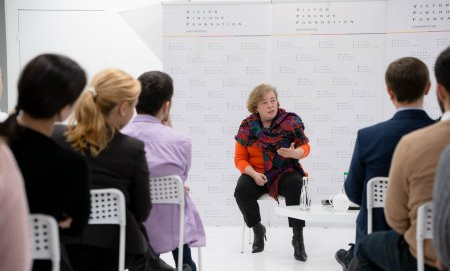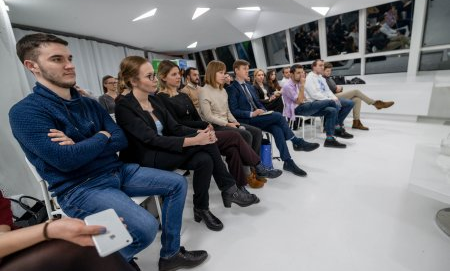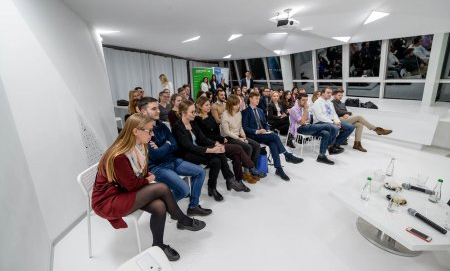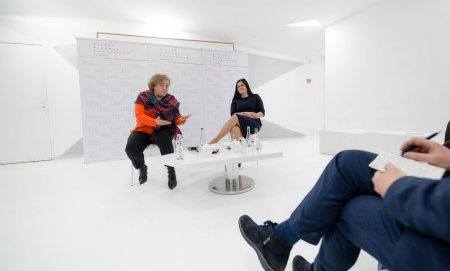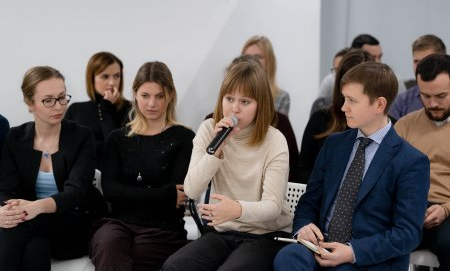Zavtra.UA: NEWS
Zavtra.UA Climate Change Camp held by the Victor Pinchuk Foundation and Coca-Cola Foundation for the scholarship holders of “Zavtra.UA” program ended
Educational workshop Zavtra.UA Climate Change Camp on the problems of environment and development of cutting-edge energy saving technologies ended. The event was organized for the Zavtra.UA scholarship holders by the Victor Pinchuk Foundation and supported by the Coca-Cola Foundation. The camp was based in Pishchanka village of Dnipropetrovsk region.

After the camp closed, Oksana Kulakovska, Head of the Department of Education of the Victor Pinchuk Foundation, shared her personal experience and talked about activities the camp participants were involved in, who they met from the expert panel and what places they visited.
Oksana, how did the idea of holding Zavtra.UA Climate Change Camp with the support of the Coca-Cola Foundation occur? Why ecology in particular was chosen as a topic of the forum?
Zavtra.UA program has a long-established tradition of communication and cooperation with leaders and heads of the companies best known in Ukraine and internationally, as many of them over the years of the program existence were among invited experts, mentors and guests of honor. After all, the mission of the program is to actually facilitate formation and fostering of a new generation of Ukraine’s intellectual and business elites. Zavtra.UA community of scholarship holders for a number of years had been successfully implementing national project “Nature Reserve” - summer social project designed to improve ecological situation at the remarkable sites of cultural and historical significance, as well as to increase public awareness regarding those problems faced by historical and cultural heritage sites of Ukraine. In addition, small teams of the program scholars in different cities of Ukraine regularly implement various social projects, ideas for which are generated at Zavtra.UA Youth Forums. Thus it was the experience gained by the young scholars through project implementation and previous cooperation with the top managers of Coca-Cola in Ukraine that prompted a great idea to do a joint project that would focus on the most pressing issues of the future challenges, including climate change, which is one of the key topics of the Coca-Cola Foundation.
What is, in your opinion, the main idea of the Zavtra.UA Climate Change Camp? Was it hard to round up young people during their summer holidays? How was the camp represented in geographic terms?
On one hand, the idea of this camp was to offer its participants a deeper contextual understanding of the challenges faced by the whole world, the challenges caused (or that might be caused in the future) by the phenomenon, which is on everyone’s lips, namely the climate change: what factors cause these changes and what one can do to slow them or mitigate their impact on the environment. On the other hand, and more importantly, we wanted to let them know and let them feel – through practical involvement – that by making small steps each of them can affect some changes, but when together as one, in joint projects or initiatives, they are, in fact, a huge force! Community of the scholarship holders is a kind of a platform for interaction of the likeminded, action-driven young people with common views and values. Therefore, they are always happy to take any opportunity to get and spend some time together – they are not deterred neither by time (in fact, it’s much easier for them to gather during summer holidays than in any other period of time), nor by the distance, although they do represent different regions of our country.
What were they doing all these days? And why did you base practically in a village far in Dnipropetrovsk region?
All four days of the camp were packed with different forms of activities: the first day traditionally consisted of team-building events to enable newcomers to meet, make friends and form teams in which they would continue working on ideas and projects. The following day, the participants split into 15 teams had been generating ideas and developing them into projects ready for implementation. While working in teams, young scholars at all times were guided by mentors - invited experts in the field of renewable energy, energy conservation, people with western education and experience in managing successful environmental projects. Interestingly enough, nearly half of the mentors were grantees of another foundation’s scholarship program titled WorldWideStudies – a program helping talented young people pursue Master’s degree at the world’s top universities. Apart from guiding the teams, mentors and experts had a chance to share their experience and knowledge through thematic presentations. On the third day workshop participants joined the environmental initiative, tiding up the banks of the Samara River where the camp was based: they cleaned about 7 hectares and collected more than 1 ton of waste. The day ended with bright presentations of projects and, after an emotional anticipation, announcement of a winning team.
On the last day the camp participants visited INTERPIPE STEEL in Dnepropetrovsk - one of the most modern, most energy efficient and environment-friendly plants in the world, which has become a shining example of many things discussed in the camps. And the artworks by one of the world famous contemporary art authors Olafur Eliasson made this visit unforgettable. As for the venue of the camp, over the years Zavtra.UA scholars visited nearly all parts of the country. So why not Dnipropetrovsk this time? - particularly having an opportunity to visit such an exciting plant.

Generating ideas and developing them into projects is not new to Zavtra.UA scholars. Participants of the 6th Zavtra.UA Youth Forum had a chance to try themselves as “startupers” and develop their own projects, both commercial and social. In your opinion, was it hard for the students to generate ideas on environmental issues? Did they manage to be creative and innovative?
If there is one thing our students don’t lack, this is creativeness, along with inspiration and eagerness. They have so much of it that even us, the event organizers, “feed” our batteries of this infinite source of energy! And there is no problem whatsoever with the socially inclined ideas - much of the fellows have experience of direct involvement in the ongoing social and partly environmental initiatives in their native cities. Actually, innovation is more of an issue because innovation is a creative idea that can be capitalized. And sometimes it is obvious that some participants lack "working" experience or sometimes business thinking that could help them analyze ideas in terms of their value, think of who they are generated for and what is expected as an outcome, do financial calculations and so forth. And this is exactly why mentors are involved - experienced people who can suggest something, or just ask the right question.
What were the winner selection criteria? What was the number of the winners and what happens to them afterwards?
We didn’t have any specific criteria because projects were so different both in essence and scale, we just did not want to limit the participants in their creative approaches to the presentation of ideas – often it was more of a theatre show and not a simple presentation in Power Point! The key task was to “sell” their idea to the jury in 5 minutes: clearly convey the idea and persuade the jury that this project was feasible and the team had a clear understanding on what to do with it further. And there were many teams. One idea sounded so convincing that our partner, the Coca-Cola Foundation, decided to offer an additional prize and financial support for the implementation of this project. As for the winning team, they have a chance to participate in another camp – TeslaCamp, first open-air off-green solar-powered hackathon for social innovations, sustainable energy, climate-friendly solutions. This is where their project will acquire its final shape, and the team members will get inspiration for its implementation.

What would you personally want that young scholars discover, learn from this forum and keep on doing in the future? Should we expect Climate Change Camp II next year?
We sincerely hope that there will be another Climate Change Camp! As for me personally, the first attempt turned out to be successful and demonstrated the need for creating right conditions for young people who are active, ready to take on responsibility and to get involved in public activity: right conditions to communicate, to discuss today’s pressing issues and to look together for the right solutions, as well as to learn to work in teams and, as I mentioned earlier, to understand that a team of the likeminded people inspired by a common idea is one great force, which is able to achieve great things. To support this single platform community, to encourage this community to generate and implement initiatives that are crucial for our country – this, in particular, is our key task.


